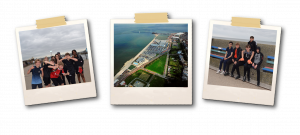Geography
Intent: The Big Ideas in Geography at AHS
Our curriculum goal is to support pupils to understand the world through the lens of geography by developing knowledge of rapidly changing environmental and societal challenges and analysing how we address them.
The geography curriculum is organised and taught through the development of six big ideas: space, place, Earth systems, the environment, interconnection and geographical interpretation.
Space and Place:
- To gain knowledge of the ideas of location, space, and place and how this relates to the students’ place in the world and their perspective of it.
- To develop a sense of where things are, what different places are like and gain deep knowledge of a range of places in the UK and the world which have been carefully chosen to help the students understand the variety in the world as well as the patterns which geographers regularly identify in the living world.
- To recognise the scale of different geographical features and be able to compare the features of places in the world from the very large, such as the continents of Africa and Asia, to very specific areas of cities such as the regeneration of Salford Quays.
Earth Systems:
- To gain knowledge of physical geography such as the geological processes which lead to earthquakes and volcanic activity as well as atmospheric processes which dictate the weather and climate for different regions of the globe.
- To know about the hydrological cycle and how this leads to rivers, their landforms and the changes which occurs within rivers.
- To know about the physical processes which occur at coasts such as erosion and deposition.
Environment:
- To understand how human civilisation has developed in relation to the physical environment.
- To understand that humans react to the environment which is created by and changed by Earth systems but that they also create their own environment and this impacts on Earth systems such as the climate.
Interconnection
- To know that the three branches of geographical study are: human; physical and environmental, and to know how the world is interconnected through these different fields of study.
Interpretation
- To speak and write like a geographer and to develop the disciplinary knowledge and skills required for critical thinking about key geographical issues. To do this the students will draw upon a wide variety of data, collected through fieldwork conducted by the students and from geographical information systems. Students will know how to collect, present, and analyse data, and reach conclusions based on this data.
How the Geography curriculum contributes to the school’s curriculum intent:
Our curriculum supports students from all backgrounds, including those who are disadvantaged, so students can access a high-quality, knowledge-rich curriculum. Our school community believes strongly in providing disadvantaged pupils with a curriculum that enables them to reach the academic standards of their non-disadvantaged peers. Our goal is to bring our young people into the big conversations of our disciplines, to bring depth to our curriculum, so they can understand the world around them.
- Knowledge is developed through a range of topics at KS3, these include; map skills, weather patterns, tectonic hazards, urbanisation and settlements, climate change, globalisation and various case studies at KS3. This embeds the knowledge they need to know to further study at KS4.
- Vocabulary rich through exposure to subject specific vocabulary in human, physical and environmental geography topics across KS3 and KS4 and applied in extended writing.
- Aspiration through challenging subject matter and difficult geographical concepts. Challenge through critical and evaluative thinking and extended writing; critical thinking. Formative feedback to support the culture of improvement – we can and always do improve our work, knowledge and skills.
- Character building through study and evaluation of ethical and philosophical questions/issues contributing to social, moral, spiritual and cultural development. This is intended to produce pupils who understand and begin to make sense of the world around them as the geography curriculum is linked to real life themes & issues. Resilience & mental toughness is also fostered through the climate for learning in the geography classroom: can-do culture, learning from mistakes, and improving work based on quality teacher feedback.
- Love learning as pupils study engaging, real life themes which develop critical thinking. Deep human questions are tackled to engage and foster a love of learning. Teaching methods use a range of research-led techniques to engage pupils and foster a love of learning. Challenge is promoted through deep learning to develop pride in achievement to develop confidence, self-belief, and inspiration to learn more.
The Geography Learning Journey
Geography Knowledge Organisers
Autumn Term
Spring Term
Summer Term
| YEAR 7 | YEAR 8 | YEAR 9 | YEAR 10 | YEAR 11 |
| 7.5 Weather & Climate | 8.5 Coasts | 9.5 Ecosystems TRF | 10.5 Urban Issues and Challenges | Food |
| 8.6 Africa | 9.6 Ecosystems HD | GCSE Human Resource management |
Reading in Geography
In Geography, reading is prioritised as one of core ambitions for our students is for them to be able to speak and write like a geographer. This means that all year groups are exposed to a wide variety of information sources, from newspaper articles to technical data from geographical information systems like weather and climate data. The students are guided to achieve excellence in understanding this complex information in written form. In addition, they are challenged as the students use the information they have gathered to produce written work of the highest quality, using the key technical vocabulary gained through rigorous study of geographical texts.
Learning Beyond the Classroom in Geography
In Geography our Year 8 students have travelled to New Brighton on the Wirral to complete geographical fieldwork relating to coastal management techniques. They completed an environmental survey on the hard and soft engineering strategies being used to protect the wildlife habitat and the tourism facilities at New Brighton as well as talking to tourists in the area about the amenities in the area. In addition, they studied the changing nature of the industrial and commercial buildings on the River Mersey and the surrounding area, this was to gain an understanding of how the space has been used in the past and today and why it has changed over time.





